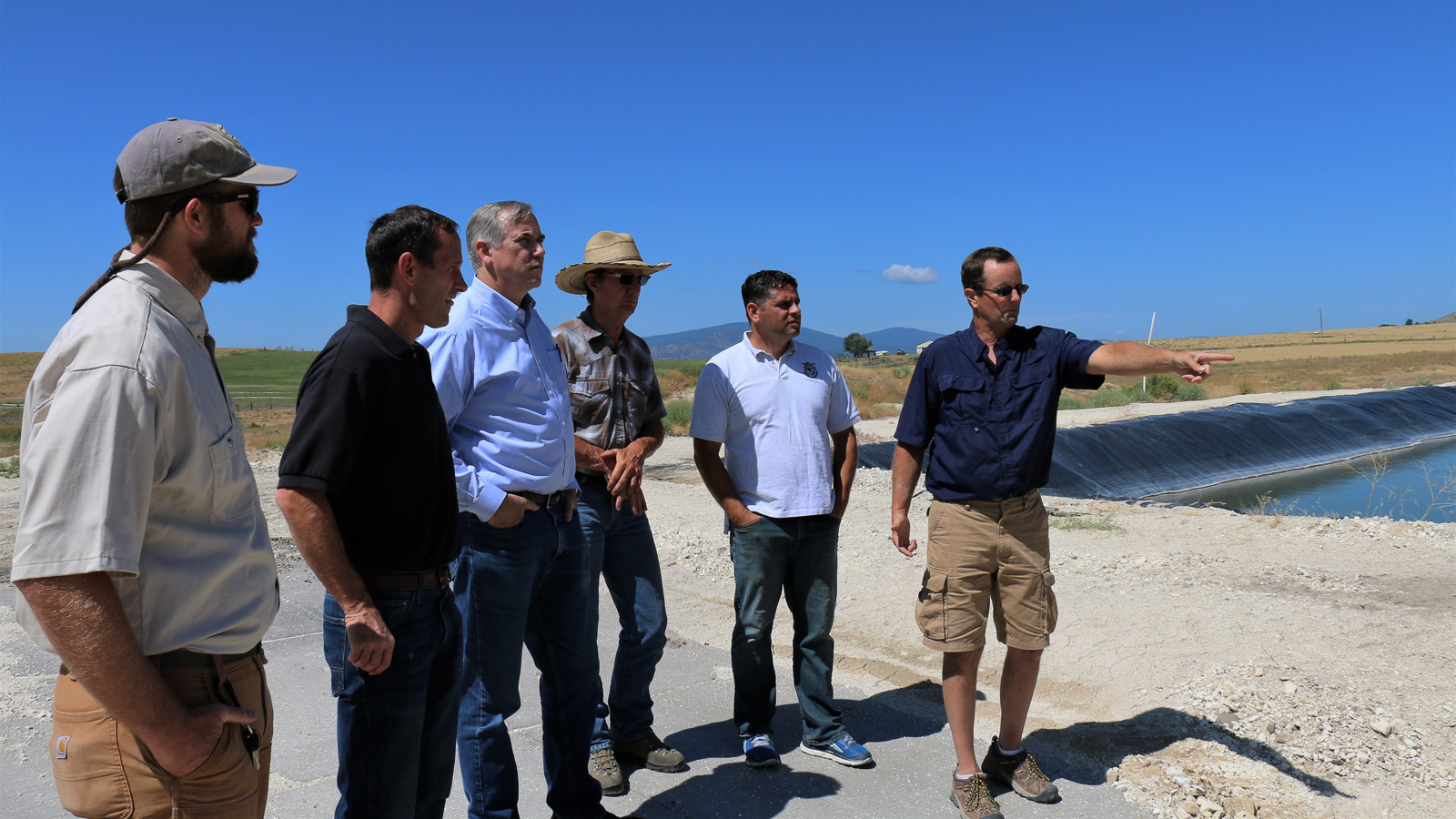Merkley tours sucker recovery program
/Klamath Tribes Chairman, Don Gentry (left) discusses suckerfish with US Senator Jeff Merkley (right) while heading up Upper Klamath Lake to view the US Fish and Wildlife’s floating net pens.August 12, 2019 (Image, Brian Gailey / Klamath Falls News)
US Senator Jeff Merkley discusses lake biology with Josh Rasmussen a Fish Biologist for USFWS and USFWS Field Supervisor Dan Blake. August 12, 2019 (Image: Brian Gailey / Klamath Falls News)
Senator Jeff Merkley visited Klamath Falls on Monday to tour the rearing ponds at Gone Fishing and the floating net pens on Upper Klamath Lake. This was Merkley’s first visit to tour the facilities following his Sucker Recovery Event held last fall. Following the summit, Merkley secured $3 million in federal funding for an expansion of the project.
The goal of the facilities is to raise federally endangered Lost River and Short nose sucker fish to be released into the lake.
“In the face of extreme drought, suffocating wildfires, and other water resource challenges, stakeholders across the board came together to begin addressing one piece of the puzzle: endangered sucker survival,” Merkley said. “This private-public partnership shows the Basin’s determination to come together and tackle this challenge in the short and long term. I am committed to being a strong federal partner and continuing to work in a bipartisan, bicameral manner to secure resources for the Basin.”
“Lost River and shortnose sucker populations are suffering a downward trajectory. However, we believe this trend can be reversed through the off-site rearing and habitat restoration work,” said Dan Blake, Field Supervisor for the US Fish and Wildlife.
Currently, juvenile suckers in the Klamath Basin are not maturing to spawn and older fish are dying off. Under the current life cycle, it’s estimated that suckerfish in UKL would be extinct in 25-30 years. This has then created crisis conditions for the essential tribal treaty resources of the Klamath Tribes, and for farmers & ranchers, whose irrigation supply is affected by the need for in-stream water for the endangered fish.
“Restoring the fish would bring a balance back to the lake and more water for all,” Merkley said.
Current production of the facilities is at 10,000 fish per year. For proper rehabilitation of the species, US Fish and Wildlife estimates production needs to increase to 60,000 fish per year for the next 30 years. Merkley is working to cut government red tape so more ponds can be constructed to hold 60,000 fish.
Merkley tours the Lost River and Shortnose Suckerfish rearing facility at Gone Fishing. August 12, 2019 (Image: Sara Hottman)
“Our goal is to recover the species so that water can be available for everybody again,” said Ron Barnes of Gone Fishing.
Tracey Liskey, a longtime Klamath Basin Farmer said, “I want the water back, so I want the fish healthy.”
As part of the expansion following the Sucker Recovery Summit, the Gone Fishing project installed net pens about 8 miles into Upper Klamath Lake, where suckers live in the wild. Now, instead of releasing 2-year-old suckers into the lake, the suckers go to the net pens to become acclimated to the environment. Once they’re 3 years old, they’ll be released in different parts of the lake. Trackers enable the USFWS to monitor their health and survival.
By acclimating the sucker fish in the floating pens, the hope is that once released the sucker fish will survive in the wild and achieve the ability to spawn on their own.
While fish biologists are attempting to find a solution to the young fish mortality issue, they are also working on finding a solution to why the fish are not surviving naturally in the lake.
“It might be related to the levels of phosphorous in the lake,” said Merkley. “Part of the solution is learning more about how these levels change the conditions of the lake.”
“The lake is not functioning as well as it could,” said Blake. “It’s because of that that the suckers aren’t doing as well as they could. So, I do believe that if we could get the lake in better shape, the suckers will be in better shape and that should help improve other things.”
“On behalf of the Klamath Tribes, I thank Senator Merkley for his continued interest in doing everything possible to recover the sucker,” said Gentry. “His vision for the Sucker Recovery Summit provided an opportunity to cooperatively identify and consider projects focused on addressing the complex problems threatening the very survival of the suckers. With the expansion of Gone Fishing, and with the funding the Senator secured, we are hopeful that we will continue to make progress on helping increase the populations of the endangered C’waam and Koptu, so very important to our people.”
During the tour of the pens on Upper Klamath Lake, Merkley was joined by:
Don Gentry, Chairman of the Klamath Tribes
Dan Blake, Field Supervisor of the US Fish and Wildlife
Fish Biologists, Josh Rasmussen & Zach Tiemann
and members of the media















